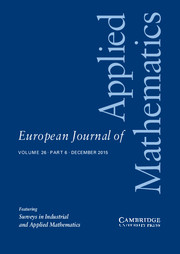Crossref Citations
This article has been cited by the following publications. This list is generated based on data provided by
Crossref.
Du, Qiang
2007.
Quantized vortices in BEC and superconductors.
PAMM,
Vol. 7,
Issue. 1,
p.
1023901.
Bao, Weizhu
Zeng, Rong
and
Zhang, Yanzhi
2008.
Quantized vortex stability and interaction in the nonlinear wave equation.
Physica D: Nonlinear Phenomena,
Vol. 237,
Issue. 19,
p.
2391.
Wang, Hanquan
2010.
An efficient Chebyshev–Tau spectral method for Ginzburg–Landau–Schrödinger equations.
Computer Physics Communications,
Vol. 181,
Issue. 2,
p.
325.
Kong, Linghua
Hong, Jialin
Fu, Fangfang
and
Chen, Jing
2011.
Symplectic structure-preserving integrators for the two-dimensional Gross–Pitaevskii equation for BEC.
Journal of Computational and Applied Mathematics,
Vol. 235,
Issue. 17,
p.
4937.
Zhang, Yanzhi
Peterson, Janet
and
Gunzburger, Max
2011.
Maximizing critical currents in superconductors by optimization of normal inclusion properties.
Physica D: Nonlinear Phenomena,
Vol. 240,
Issue. 21,
p.
1701.
Gelantalis, Michael
and
Sternberg, Peter
2012.
Rotating 2N-vortex solutions to the Gross-Pitaevskii equation on S2.
Journal of Mathematical Physics,
Vol. 53,
Issue. 8,
Smirnov, L. A.
and
Mironov, V. A.
2012.
Dynamics of two-dimensional dark quasisolitons in a smoothly inhomogeneous Bose-Einstein condensate.
Physical Review A,
Vol. 85,
Issue. 5,
Bao, Weizhu
and
Tang, Qinglin
2013.
Numerical Study of Quantized Vortex Interaction in the Ginzburg-Landau Equation on Bounded Domains.
Communications in Computational Physics,
Vol. 14,
Issue. 3,
p.
819.
Jiang, Wei
and
Tang, Qinglin
2013.
Numerical study of quantized vortex interaction in complex Ginzburg–Landau equation on bounded domains.
Applied Mathematics and Computation,
Vol. 222,
Issue. ,
p.
210.
Wang, Shanshan
and
Zhang, Luming
2013.
An efficient split-step compact finite difference method for cubic–quintic complex Ginzburg–Landau equations.
Computer Physics Communications,
Vol. 184,
Issue. 6,
p.
1511.
Zhang, Ya‐nan
Sun, Zhi‐zhong
and
Wang, Ting‐chun
2013.
Convergence analysis of a linearized Crank–Nicolson scheme for the two‐dimensional complex Ginzburg–Landau equation.
Numerical Methods for Partial Differential Equations,
Vol. 29,
Issue. 5,
p.
1487.
Caplan, R. M.
and
Carretero-González, R.
2014.
A Modulus-Squared Dirichlet Boundary Condition for Time-Dependent Complex Partial Differential Equations and Its Application to the Nonlinear Schrödinger Equation.
SIAM Journal on Scientific Computing,
Vol. 36,
Issue. 1,
p.
A1.
Bao, Weizhu
and
Tang, Qinglin
2014.
Numerical Study of Quantized Vortex Interactions in the Nonlinear Schrödinger Equation on Bounded Domains.
Multiscale Modeling & Simulation,
Vol. 12,
Issue. 2,
p.
411.
Li, Leonard Z.
Sun, Hai-Wei
and
Tam, Sik-Chung
2015.
A spatial sixth-order alternating direction implicit method for two-dimensional cubic nonlinear Schrödinger equations.
Computer Physics Communications,
Vol. 187,
Issue. ,
p.
38.
Yan, Yun
Moxley, Frederick Ira
and
Dai, Weizhong
2015.
A new compact finite difference scheme for solving the complex Ginzburg–Landau equation.
Applied Mathematics and Computation,
Vol. 260,
Issue. ,
p.
269.
Lai, Ru-Yu
Shankar, Ravi
Spirn, Daniel
and
Uhlmann, Gunther
2017.
An inverse problem from condensed matter physics.
Inverse Problems,
Vol. 33,
Issue. 11,
p.
115011.
He, Dongdong
and
Pan, Kejia
2017.
An unconditionally stable linearized CCD–ADI method for generalized nonlinear Schrödinger equations with variable coefficients in two and three dimensions.
Computers & Mathematics with Applications,
Vol. 73,
Issue. 11,
p.
2360.
Wang, Nan
and
Huang, Chengming
2018.
An efficient split-step quasi-compact finite difference method for the nonlinear fractional Ginzburg–Landau equations.
Computers & Mathematics with Applications,
Vol. 75,
Issue. 7,
p.
2223.
Demirkaya, Betül
Dereli, Tekin
and
Güven, Kaan
2019.
Analog black holes and energy extraction by super-radiance from Bose Einstein condensates (BEC) with constant density.
Heliyon,
Vol. 5,
Issue. 9,
p.
e02497.
Demirkaya, Betül
Dereli, Tekin
and
Güven, Kaan
2020.
Acoustic superradiance from a Bose–Einstein condensate vortex with a self-consistent background density profile.
Physica Scripta,
Vol. 95,
Issue. 5,
p.
055001.

